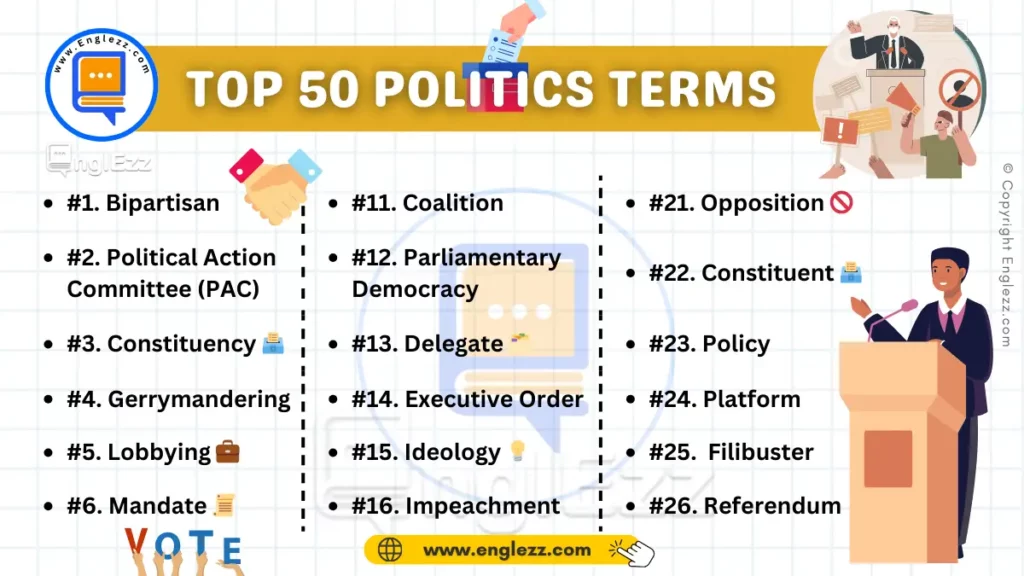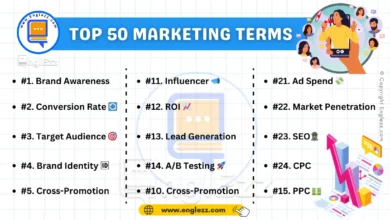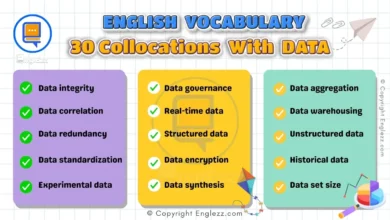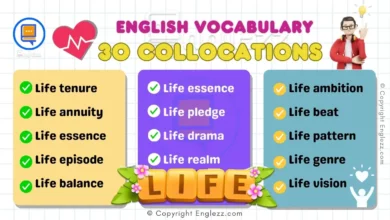Politics, with its complex and nuanced language, can often feel like a labyrinth of terminology. Whether you’re a student, a professional, or just someone interested in understanding the political discourse, mastering common political terms is crucial. This blog post breaks down top 50 essential politics English terms, providing clear definitions, phonetic transcriptions, and practical examples.
50 Essential Politics English Terms Explained with Examples
Understanding these terms will not only enhance your comprehension of political discussions but also enable you to engage more effectively in debates and analyses. From “bipartisan” to “sovereignty,” we’ve compiled a list of terms that will help demystify the language of politics.
Our goal is to make these concepts accessible and relatable, so you can navigate political conversations with confidence. So, let’s dive into these key terms and get a clearer picture of the political landscape!
#1. Bipartisan 🤝
Definition: Involving the agreement or cooperation of two political parties that usually oppose each other.
Phonetic Transcription: /baɪˈpɑːr.tɪ.zən/
Examples:
- The bipartisan bill aimed to improve infrastructure by securing support from both major parties.
- Their bipartisan effort on education reform led to significant policy changes.
#2. Constituency 🗳️
Definition: A body of voters in a specified area who elect a representative to a legislative body.
Phonetic Transcription: /kənˈstɪt.ju.ən.si/
Examples:
- The senator met with her constituency to discuss new healthcare policies.
- During the election, the candidate focused on addressing the concerns of their constituency.
#3. Filibuster ⏳
Definition: An action such as a prolonged speech that obstructs progress in a legislative assembly.
Phonetic Transcription: /ˈfɪl.ɪˌbʌs.tər/
Examples:
- The senator’s filibuster delayed the vote on the controversial bill for hours.
- To prevent the bill from passing, the opposition resorted to a filibuster.
#4. Gerrymandering 🎨
Definition: The manipulation of electoral district boundaries to favor a particular political party or group.
Phonetic Transcription: /ˈdʒɛr.iˌmæn.dɚ.ɪŋ/
Examples:
- The new district lines were criticized for gerrymandering, which gave an unfair advantage to one party.
- Gerrymandering can distort election results by changing district boundaries to benefit certain candidates.
#5. Lobbying 💼
Definition: The act of attempting to influence decisions made by officials in the government, typically by special interest groups.
Phonetic Transcription: /ˈlɒb.i.ɪŋ/
Examples:
- The environmental group engaged in lobbying to promote stricter regulations on pollution.
- Successful lobbying efforts led to the passage of new regulations on corporate tax.
#6. Mandate 📜
Definition: An official order or commission to do something, often granted by an electoral victory.
Phonetic Transcription: /ˈmæn.deɪt/
Examples:
- The president’s mandate was clear: overhaul the healthcare system.
- With a strong electoral mandate, the new governor pursued ambitious reforms.
#7. Partisan 🗂️
Definition: Strongly supporting one party or cause, often leading to bias or lack of objectivity.
Phonetic Transcription: /ˈpɑːr.tɪ.zən/
Examples:
- The media coverage was criticized for its partisan tone, favoring one political side over the other.
- Partisan politics can lead to gridlock in Congress, preventing effective governance.
#8. Pluralism 🌐
Definition: A political theory that recognizes and affirms the diversity of interests and groups within a society.
Phonetic Transcription: /ˈplʊə.rəl.ɪ.zəm/
Examples:
- The country’s pluralism is reflected in its diverse political parties and interest groups.
- Pluralism in politics encourages dialogue among different cultural and ideological groups.
#9. Populism 🎤
Definition: A political approach that seeks to represent the interests of ordinary people against the elite.
Phonetic Transcription: /ˈpɒp.jʊ.lɪ.zəm/
Examples:
- The candidate’s populism resonated with voters who felt disconnected from the political elite.
- Populism often emerges during times of economic distress, promising to address the common people’s grievances.
#10. Sovereignty 🌍
Definition: The authority of a state to govern itself or another state.
Phonetic Transcription: /ˈsɒv.rən.ti/
Examples:
- The debate over sovereignty centered on whether the state should cede certain powers to international organizations.
- National sovereignty is a key issue in discussions about global governance and treaties.
#11. Coalition 🤝
Definition: An alliance of various political parties or groups for a common purpose, especially to form a government.
Phonetic Transcription: /ˌkəʊ.əˈlɪʃ.ən/
Examples:
- The coalition government was formed after no single party won a majority in the election.
- The environmental coalition advocated for new climate policies.
#12. Constituent 🗳️
Definition: A person who lives in and can vote in a particular electoral district.
Phonetic Transcription: /kənˈstɪt.ju.ənt/
Examples:
- The representative met with constituents to hear their concerns about new legislation.
- Constituents often reach out to their elected officials to express their opinions on various issues.

#13. Delegate 🗂️
Definition: A person chosen or elected to represent others, particularly in a political context.
Phonetic Transcription: /ˈdel.ɪ.ɡət/
Examples:
- The delegates at the convention voted on the party’s platform.
- Each state sent a number of delegates to the national party convention based on its population.
#14. Executive Order 📝
Definition: A directive issued by the president or other executive authority to manage the operations of the federal government.
Phonetic Transcription: /ɪɡˈzɛk.jə.tɪv ˈɔːr.dər/
Examples:
- The president issued an executive order to address the emergency situation.
- Executive orders can have significant impacts on national policies and regulations.
#15. Ideology 💡
Definition: A set of beliefs or ideas that guides political theory and policy.
Phonetic Transcription: /ˌaɪ.diˈɒl.ə.dʒi/
Examples:
- The party’s ideology is based on principles of economic freedom and individual rights.
- Different political ideologies influence how policies are formulated and implemented.
#16. Impeachment 🚨
Definition: The process by which a legislative body formally charges a high official with misconduct.
Phonetic Transcription: /ɪmˈpiːtʃ.mənt/
Examples:
- The president faced impeachment proceedings over allegations of abuse of power.
- Impeachment requires a majority vote in the House and a trial in the Senate.
#17. Incumbent 🏛️
Definition: The current holder of a political office.
Phonetic Transcription: /ɪnˈkʌm.bənt/
Examples:
- The incumbent mayor is running for re-election after serving two terms.
- Incumbent candidates often have an advantage due to their established position.
#18. Majority 🏆
Definition: The greater number or part of a group, particularly in a voting context.
Phonetic Transcription: /məˈdʒɒr.ɪ.ti/
Examples:
- A majority vote is required to pass most legislation in Congress.
- The party won a majority in the House of Representatives.
#19. Minority 🧑🤝🧑
Definition: A smaller number or part of a group, especially in a voting context.
Phonetic Transcription: /maɪˈnɒr.ɪ.ti/
Examples:
- The minority party struggled to influence the legislative agenda.
- Despite being a minority, the group’s views were considered in the final decision.
#20. Nominee 🏅
Definition: A person proposed or officially nominated for an election or appointment.
Phonetic Transcription: /ˌnɒm.ɪˈniː/
Examples:
- The nominee for the Supreme Court was confirmed by the Senate.
- Each party’s nominee for president is selected at the national convention.
#21. Opposition 🚫
Definition: The political parties or groups that are not in power and are critical of the government.
Phonetic Transcription: /ˌɒpəˈzɪʃ.ən/
Examples:
- The opposition criticized the new tax reforms as unfair to middle-class families.
- Effective opposition is essential for holding the government accountable.
#22. Parliamentary Democracy 🏛️
Definition: A democratic form of government in which the executive branch derives its legitimacy from and is directly accountable to the legislature.
Phonetic Transcription: /ˈpɑːr.ləˌmen.tə.ri dɪˈmɒk.rə.si/
Examples:
- In a parliamentary democracy, the prime minister is elected by the legislature.
- The country’s parliamentary democracy allows for frequent changes in government leadership.
#23. Policy 📝
Definition: A course or principle of action adopted or proposed by a government, party, or individual.
Phonetic Transcription: /ˈpɒl.ɪ.si/
Examples:
- The new environmental policy aims to reduce carbon emissions by 20% over the next decade.
- Policy changes can have significant impacts on the economy and society.
#24. Platform 🗺️
Definition: The set of principles and policies that a political party or candidate advocates.
Phonetic Transcription: /ˈplæt.fɔːm/
Examples:
- The party’s platform included comprehensive healthcare reform and education improvements.
- Candidates often outline their platforms during debates and speeches.
#25. Political Action Committee (PAC) 💼
Definition: An organization that raises money privately to influence elections or legislation.
Phonetic Transcription: /pəˌlɪt.ɪ.kəl ˈæk.ʃən kəˌmɪt.i/
Examples:
- The PAC supported several candidates who aligned with its policy goals.
- PACs play a significant role in funding political campaigns and influencing public policy.
#26. Referendum 📊
Definition: A direct vote by the electorate on a specific proposal, often a change in law.
Phonetic Transcription: /ˌrɛf.əˈrɛn.dəm/
Examples:
- The referendum on constitutional amendments attracted widespread public interest.
- Voters will decide on the new tax proposal through a referendum next month.
#27. Republic 🏛️
Definition: A form of government in which the country is considered a “public matter,” with elected officials rather than a monarch.
Phonetic Transcription: /rɪˈpʌb.lɪk/
Examples:
- The United States is a republic with elected representatives at various levels of government.
- In a republic, the head of state is elected, not inherited.
#28. Secession 🚪
Definition: The action of withdrawing formally from a federation or body, especially a political state.
Phonetic Transcription: /sɪˈsɛʃ.ən/
Examples:
- The region’s attempt at secession led to a significant political crisis.
- Secession movements can challenge national unity and lead to complex negotiations.
#29. Senate 🏛️
Definition: The upper house of a bicameral legislature, typically responsible for reviewing and passing legislation.
Phonetic Transcription: /ˈsɛn.ət/
Examples:
- The Senate debated the new healthcare bill for several weeks before voting.
- Senators play a key role in confirming judicial appointments.
#30. Suffrage 🗳️
Definition: The right to vote in political elections.
Phonetic Transcription: /ˈsʌf.rɪdʒ/
Examples:
- The movement for women’s suffrage gained momentum in the early 20th century.
- Universal suffrage ensures that all eligible citizens have the right to vote.
#31. Treaty 🤝
Definition: A formally concluded and ratified agreement between countries.
Phonetic Transcription: /ˈtriː.ti/
Examples:
- The peace treaty ended years of conflict between the two nations.
- Treaties can cover various issues, from trade to environmental protection.
#32. Unilateral 🌍
Definition: An action or decision taken by one country or party without the agreement or cooperation of others.
Phonetic Transcription: /ˌjuː.nɪˈlæt.ər.əl/
Examples:
- The country’s unilateral decision to impose tariffs led to trade disputes.
- Unilateral actions can sometimes strain international relations.
#33. Veto 🚫
Definition: The power to reject or prohibit a decision or proposal made by a legislative body.
Phonetic Transcription: /ˈviː.toʊ/
Examples:
- The president used his veto power to block the proposed legislation.
- A veto can prevent a bill from becoming law unless overridden by the legislature.
#34. Whip 📋
Definition: A party official responsible for ensuring party members vote according to party policy.
Phonetic Transcription: /wɪp/
Examples:
- The whip ensured that all party members were present for the crucial vote.
- Whips play a key role in maintaining party discipline and cohesion.
#35. Caucus 🗳️
Definition: A meeting of members of a political party or group to make decisions or select candidates.
Phonetic Transcription: /ˈkɔː.kəs/
Examples:
- The caucus will decide which candidate to support in the upcoming election.
- In some states, caucuses are used instead of primaries to select party nominees.
#36. Campaign 🎯
Definition: An organized effort to influence the decision-making process of a specific group or the public.
Phonetic Transcription: /kæmˈpeɪn/
Examples:
- The candidate’s campaign focused on issues like healthcare and education.
- Campaign strategies can include advertisements, rallies, and grassroots organizing.
#37. Electoral College 🏛️
Definition: A body of electors chosen by voters to elect the president and vice president of the United States.
Phonetic Transcription: /ɪˌlɛkˈtɔːr.əl ˈkɒl.ɪdʒ/
Examples:
- The Electoral College system determines the outcome of the presidential election.
- Each state has a certain number of electoral votes based on its population.
#38. Federalism 🇺🇸
Definition: A system of government in which power is divided between a central authority and constituent political units.
Phonetic Transcription: /ˈfɛd.ə.rəl.ɪ.zəm/
Examples:
- Federalism allows states to have their own laws and regulations while adhering to national standards.
- The debate over federalism often involves discussions about the balance of power between state and federal governments.
#39. Ideological Spectrum 🌈
Definition: The range of political beliefs and ideologies from left to right.
Phonetic Transcription: /ˌaɪ.di.əˈlɒdʒ.ɪ.kəl ˈspɛk.trəm/
Examples:
- The ideological spectrum in politics includes a variety of views from conservative to liberal.
- Understanding the ideological spectrum helps in analyzing political debates and positions.
#40. Judicial Review ⚖️
Definition: The power of courts to assess whether a law or executive action is consistent with the constitution.
Phonetic Transcription: /dʒuːˈdɪʃ.əl rɪˈvjuː/
Examples:
- Judicial review allows courts to invalidate laws that violate constitutional principles.
- The Supreme Court’s role in judicial review is crucial for maintaining the rule of law.
#41. Lobbyist 💼
Definition: A person who tries to influence government decisions on behalf of a particular interest group.
Phonetic Transcription: /ˈlɒb.i.ɪst/
Examples:
- The lobbyist met with legislators to advocate for environmental regulations.
- Lobbyists play a significant role in shaping public policy through their interactions with lawmakers.
#42. Majority Leader 📈
Definition: The head of the majority party in a legislative body, responsible for guiding party strategy and policy.
Phonetic Transcription: /məˈdʒɒr.ɪ.ti ˈliː.dər/
Examples:
- The majority leader coordinates legislative priorities for their party.
- As majority leader, she played a key role in advancing the party’s agenda in Congress.
#43. Public Opinion 📊
Definition: The collective attitudes and beliefs of the general population regarding political issues.
Phonetic Transcription: /ˈpʌb.lɪk əˌpɪn.jən/
Examples:
- Public opinion polls can influence policymakers’ decisions on major issues.
- Understanding public opinion is crucial for politicians to address voters’ concerns.
#44. Representative Democracy 🗳️
Definition: A type of democracy in which elected officials represent the interests of the people.
Phonetic Transcription: /ˌrɛp.rɪˈzɛn.tə.tɪv dɪˈmɒk.rə.si/
Examples:
- In a representative democracy, citizens vote for representatives who make decisions on their behalf.
- The system ensures that diverse interests are represented in the legislative process.
#45. Sovereign State 🌍
Definition: A political entity that has full control over its internal and external affairs.
Phonetic Transcription: /ˈsɒv.rɪn steɪt/
Examples:
- A sovereign state has the authority to enter into treaties and engage in diplomacy.
- Sovereign states are recognized as independent and have their own governments.
#46. Taxation 💰
Definition: The process by which a government collects money from individuals and businesses to fund public services.
Phonetic Transcription: /tækˈseɪ.ʃən/
Examples:
- Taxation is used to finance public goods and services, such as education and infrastructure.
- Changes in taxation policies can impact economic behavior and government revenue.
#47. Totalitarianism 🔒
Definition: A political system in which the state holds total authority over the society and seeks to control all aspects of public and private life.
Phonetic Transcription: /ˌtəʊ.tæl.ɪˈɛə.rɪ.nɪ.zəm/
Examples:
- Totalitarian regimes often use propaganda and censorship to maintain control.
- The state’s totalitarian policies restricted freedom of speech and press.
#48. Trade Agreement 📈
Definition: A contract between two or more countries agreeing on trade relations and terms.
Phonetic Transcription: /treɪd əˈɡriː.mənt/
Examples:
- The new trade agreement aims to reduce tariffs and increase trade between the countries.
- Trade agreements can help to stimulate economic growth and international cooperation.
#49. Voter Turnout 🗳️
Definition: The percentage of eligible voters who actually cast a vote in an election.
Phonetic Transcription: /ˈvəʊ.tər ˈtɜːn.aʊt/
Examples:
- Voter turnout was higher than usual in the recent national election.
- Efforts to increase voter turnout include voter education campaigns and making voting more accessible.
#50. Welfare State 🏥
Definition: A system in which the government takes responsibility for the economic and social well-being of its citizens.
Phonetic Transcription: /ˈwɛl.fɛər steɪt/
Examples:
- The welfare state provides services such as healthcare, education, and unemployment benefits.
- Policies associated with the welfare state aim to reduce poverty and inequality.
Politics English Terms Table
| #1. Bipartisan 🤝 | #11. Coalition 🤝 | #21. Opposition 🚫 |
| #2. Constituency 🗳️ | #12. Constituent 🗳️ | #22. Parliamentary Democracy |
| #3. Filibuster ⏳ | #13. Delegate 🗂️ | #23. Policy 📝 |
| #4. Gerrymandering 🎨 | #14. Executive Order 📝 | #24. Platform 🗺️ |
| #5. Lobbying 💼 | #15. Ideology 💡 | #25. Political Action Committee (PAC) |
| #6. Mandate 📜 | #16. Impeachment 🚨 | #26. Referendum 📊 |
| #7. Partisan 🗂️ | #17. Incumbent 🏛️ | #27. Republic 🏛️ |
| #8. Pluralism 🌐 | #18. Majority 🏆 | #28. Secession 🚪 |
| #9. Populism 🎤 | #19. Minority 🧑🤝🧑 | #29. Senate 🏛️ |
| #10. Sovereignty 🌍 | #20. Nominee 🏅 | #30. Suffrage 🗳️ |
Conclusion
Understanding political terminology is essential for engaging in informed discussions and analyses of current events. By familiarizing yourself with these 50 common terms, you gain a deeper insight into how political processes and ideologies shape our world.
Whether you are a student, a professional, or simply a curious reader, having a solid grasp of these terms will enhance your ability to follow political debates and contribute meaningfully to conversations. From the intricacies of gerrymandering to the principles of pluralism, each term plays a crucial role in the fabric of political discourse.
Continue exploring and learning about these concepts to stay informed and participate actively in the democratic process. Political language can be complex, but with the right knowledge, you can navigate it with ease and confidence.









Want to master political vocabulary and understand key terms effortlessly? 🌐 Discover our comprehensive guide on 50 essential political terms, complete with definitions, phonetic transcriptions, and real-world examples.
✨Enhance your understanding and stay ahead in political discussions!
For more insightful content and to keep up with the latest in language and learning, follow and like us @EnglEzz on social media. Check out the post here:
.
https://www.englezz.com/essential-politics-english-terms/
.
#englezz #vocabulary #linguistics #politicalterms #education #learnenglish #politics #languagelearning #wordoftheday